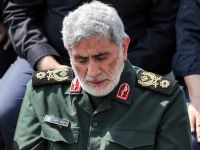The smuggling of opiates and cannabis in West Asia undermines the economic and social stability of some countries and jeopardizes peace and security in the region as a whole, asserts the 2002 annual report recently released by the International Narcotics Control Board (INCB).
Most countries in West Asia are used as transit points for smuggling opiates into Europe and other regions as chemicals, used in the illicit manufacture of heroin, continue to flow in the opposite direction, the INCB observed.
Because of drug trafficking activities in West Asia and increased illicit crop cultivation, the extent of drug abuse in the region is not declining. Opiate addiction rates in the Islamic Republic of Iran and Pakistan continue to be among the highest in the world.
The board noted that all of the 24 States in West Asia are parties to the 1961 Convention, the 1971 Convention and the 1988 Convention, and added that the Islamic Republic of Iran has acceded to the 1972 Protocol amending the 1961 Convention and that Israel has acceded to the 1988 Convention.
Extensive regional cooperation activities related to drug control continue in West Asia, the Board noted in its report and welcomed various new bilateral agreements on drug control between countries in West Asia.
On the national level, the Board noted that the government of Turkey has introduced stricter controls over narcotic drugs, psychotropic substances and precursors to and from free trade zones. The Islamic Republic of Iran has drafted a new five-year national drug program and has restructured and strengthened the Drug Control Headquarters, giving it a regular budget, independent of the proceeds of seized narcotic drugs and confiscated assets.
The Islamic Republic of Iran has also drafted a new drug law amending criminal provisions and combining law enforcement elements with initiatives for the prevention and treatment of drug abuse. The Board notes that, in 2001, a significant corruption case involving drug trafficking was uncovered in the Islamic Republic of Iran.
The Board added that Lebanon conducted an assessment of drug abuse covering different types of substances. Its findings, which pointed to the need for a continued central and standardized monitoring system that includes substance abuse data collected from different settings, may also apply to other countries in the region.
The Board welcomes the fact that the governments of Iran and Jordan have strengthened their facilities for the treatment and reintegration of drug addicts. Approximately 90 government centers offering increasingly diverse types of drug abuse treatment are operating in the Islamic Republic of Iran; the number of such centers has tripled since 2000.
However, in most countries in the region, treatment and rehabilitation services for drug addicts are still inadequate; they are mostly run by private non-governmental organizations, and most drug addicts do not know of their existence. Moreover, in many countries in the region, drug abuse treatment is only offered to persons addicted to opiates.
The Board welcomes recent efforts in several countries in West Asia to adopt or strengthen measures against money laundering. The Board welcomes, in particular, the cooperation between Pakistan and the United Arab Emirates (UAE) to prevent money laundering through the hawala system.
In Saudi Arabia, the first international conference on prevention and detection of fraud, economic crime and money laundering was held in May 2002. In the United Arab Emirates, a financial intelligence unit was established in 2001. In Israel, such a unit became fully operational in 2002.
Cannabis continues to be the most widely abused substance in West Asia. Illicit cannabis cultivation has increased in the Bekaa valley in Lebanon, where it had been eradicated in the early 1990s, although eradication efforts are still being undertaken on a regular basis. Small cannabis cultivation sites have also been reported in Turkey.
Among the arrested drug traffickers, most are arrested for trafficking in cannabis. It has been reported that in several countries (the Islamic Republic of Iran, Israel and Saudi Arabia) trafficking in cannabis has increased.
In Lebanon, small-scale illicit cultivation of opium poppy has also taken place in the Bekaa valley; eradication efforts are undertaken on a regular basis. In Turkey, poppy straw from licit
cultivation continues to be used for the extraction of alkaloids and clandestine heroin laboratories continue to be detected and dismantled.
The extent of cocaine abuse and trafficking in West Asia remains insignificant. However, a very large seizure of cocaine was reported in the Syrian Arab Republic in 2001. In Lebanon, seizures of cocaine affected during 2001 increased considerably in comparison with previous years, as a result of successful international law enforcement operations. An increasing number of seizures of small quantities of cocaine has also been reported in Israel.
Trafficking in and abuse of illicitly manufactured stimulants (often reported as Captagon) continue to be causes for concern in the eastern Mediterranean area and on the Arab peninsula. Jordan, Saudi Arabia, the Syrian Arab Republic and Turkey continue to report seizures of Captagon, believed to be illicitly manufactured in the southeastern part of Europe.
In 2002, as in previous years, the majority of the stimulants seized were destined for countries on the Arab peninsula. Data on the actual extent of the abuse of the stimulants in those countries remain scarce. The abuse of MDMA (Ecstasy) is a problem in Israel, Lebanon and, to a lesser extent, Turkey, as reflected by seizure data. — (menareport.com)
© 2003 Mena Report (www.menareport.com)







